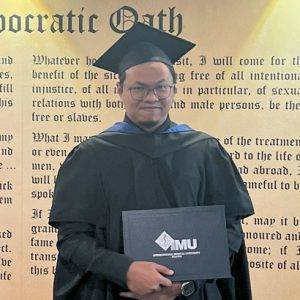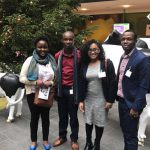Unhealthy living has brought Malaysia the undesired reputation as a country with one of the highest population of people living with diabetes in the Asia-Pacific region. In the effort to manage this disease, diabetes education provided by qualified diabetes educators continue to be one of the best ways to both educate and empower the public with the necessary tools to manage the disease and its related conditions.
| Growing a Career in Diabetes Management and Education |
|---|
| International Medical University (IMU) has one of the authorities in Diabetes Education, Dr Tan Ming Yeong, who also serves as the Vice President of the Malaysian Diabetes Educators Society. She had emphatically stated that, “Managing diabetes requires a multi-disciplinary approach that includes physicians, nurses, pharmacists, dietitians, clinical psychologists, and physiotherapist/exercise physiologists. When these healthcare providers upskill with a diabetes educator qualification, they would possess comprehensive knowledge and experience in diabetes care to promote self-management among people with diabetes for better health outcomes and quality of life.” These sentiments were echoed by Lana Vukovljak from the American Association of Diabetes Educators in a recent diabetes symposium in Pennsylvania, USA. She identified that “Diabetes educators are uniquely prepared to provide diabetes self-management education and can be found in most healthcare settings – from traditional hospital-based education programmes to community pharmacies, doctors’ offices, health food stores, and disease management companies”, thus emphasizing the importance of the diabetes management and education programme. Grace Cheah, a retail pharmacist in Kuala Lumpur currently pursuing a postgraduate degree in the Diabetes Management and Education programme (PGDME) at IMU agreed with both Dr Tan’s and Lana Vukovljak’s viewpoints, “I see that there are more people, now than ever, who have diabetes. I then decided to further my education in this area to improve my knowledge of diabetes management. I am especially keen to find better ways to manage diabetes-related complications.” |
Juggling between studies, work and family
The high incidence of diabetes in the country has driven many who are currently working in the health care sectors to arm themselves with the necessary knowledge and skills to improve their understanding and enhance their ability to manage the disease burden. A testimonial by Nadhirah Khir, a registered dietitian also cited the importance of good time management when juggling between her job and being a full-time student in IMU’s PGDME, “I decided to enhance my career with a diabetes educator qualification for better patient outcomes and a sense of self satisfaction. Managing my time wisely has helped me balance between hospital work and my postgraduate studies.”
One of the graduates of IMU’s Diabetes Management and Education programme, Ms Wong Soh San, a full time nurse, represents a growing segment of working adults who feel empowered to continue their scholarly pursuit of life-long learning while balancing a home-life. In recounting her experience Ms Wong said that, “My journey as an IMU PGDME student has been a memorable short one-year period. This programme constantly challenged me to develop myself academically, professionally and personally. Throughout my studies, the focus was not only on my academic experience, but also on my real life experience as a fully capable individual. I have discovered my strengths and weaknesses. This programme has also been made more meaningful by the forward thinking lecturers who empowered and provided tremendous support to me and my course-mates. The programme structure is holistic and has enhanced my knowledge and skill sets for my career growth. I have improved my diabetes care and delivery at my workplace and developed evidence-based educational resources for other healthcare providers.”
| Path to Getting a Diabetes Educator Qualification |
|---|
| Working adults in the health-care sectors or fresh graduates with a keen interest in diabetes education have the opportunity to can earn their PGDME at the IMU by either enrolling full-time in just 1-year or on a part-time basis within a 3-year period. Designed to suit working adults, this programme uses a blended learning model that incorporates online learning and clinical experience conducted at the student’s own place of work. This delivery allows the student to maximise learning anywhere and anytime. |










